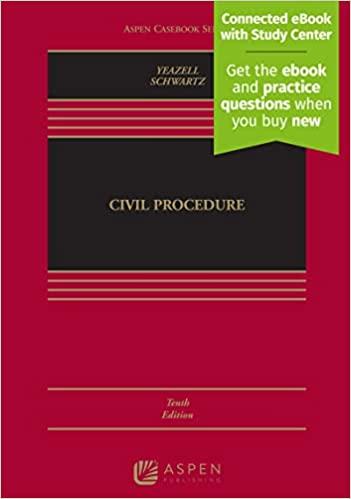Answered step by step
Verified Expert Solution
Question
1 Approved Answer
3. Barsky, page 355 #5. (A5.1). This question is worth up to 15 points. Intellectual Standards. An agency serving people with traumatic brain injuries adds
3. Barsky, page 355 #5. (A5.1). This question is worth up to 15 points. Intellectual Standards. An agency serving people with traumatic brain injuries adds a new condition in its service agreement stating that clients agree not to subpoena their workers or case records for court purposes. The directors explain the rationale for this policy as follows: In the past 2 years, the number of our social workers being subpoenaed to court has doubled. Most cases involve clients who are suing for compensation against people alleged to have caused the damage. On average, a social worker spends 12 hours preparing and 6 hours sitting in court for each case in which he or she is subpoenaed. These hours represent valuable time lost in relation to providing clients with the clinical services they need. If social workers need to be concerned about the possibility of court, they must spend extra time documenting all their cases, not knowing whether they might be called into court. Given that social workers owe their primary obligation to the clients (NASW, 2018, S.1.01), they should spend their time in direct provision of services, not testifying in court. Further, our agency does not receive sufficient renumeration for the time that workers spend in court, putting our limited resources under further strain. Our social workers are trained to provide clinical counseling services, not to provide forensic evidence. In order for our workers to stay within their areas of competence (NASW, 2018, S.1.04), we must advise clients that our workers cannot be expected to conduct forensic evaluations or provide testimony in court. In addition, by informing clients that they cannot subpoena our workers, we are honoring their right to self-determination (NASW, 2018, S.1.07) and informed consent (NASW, 2018, S.1.03) We apologize to those clients who would like our agency to provide forensic evaluations and testimony. However, we would be pleased to provide them with referrals to other agencies that may be able to assist them. Identify the strengths and limitations of the forgoing ethical analysis in terms of how well it addresses each the 10 intellectual standards for assessing the integrity of ethical reasoning: accountability, duties, consequences, breadth, relevance, clarity, accuracy, limits of information, prioritizing, mitigation (1.5 points each). Be sure to include a discussion as you see the policy counter to the principles of trauma informed practice or that re- traumatize, victimize, or oppress. Make sure you provide evidence and justification of each of these standards within the provided scenario. Isbn for book: 9780190678128
Step by Step Solution
There are 3 Steps involved in it
Step: 1

Get Instant Access to Expert-Tailored Solutions
See step-by-step solutions with expert insights and AI powered tools for academic success
Step: 2

Step: 3

Ace Your Homework with AI
Get the answers you need in no time with our AI-driven, step-by-step assistance
Get Started


